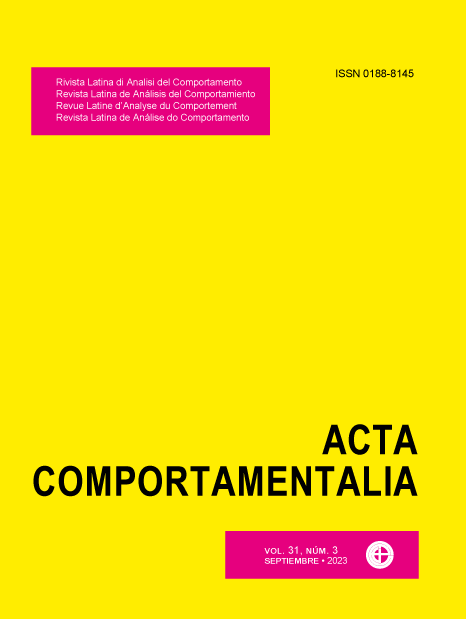Behavioral Activation: Effect on Bogotan Adults with Depression in Face-to-Face and Online Sessions
Main Article Content
Abstract
The Brief Behavioral Activation Treatment for Depression (BATD-R) is designed to increase activities aligned with personal values, resulting in a reduction of emotional symptomatology and a change in underlying cognitions. This study aimed to estimate the effect of BATD-R in two intervention modalities (group and individual), with two delivery formats (face-to-face and online), on the frequency of healthy and avoidant behaviors, and to determine changes in depression severity, perception of environmental reinforcement, emotional symptomatology, and Behavioral Activation change factors in a non-probabilistic sample of five adults aged 23-33 years with moderate depression. The study utilized a single-case A-B-Ar-C design with follow up. Phase A was the baseline intake, phase B was the administration of group-face-to-face BATD until session six out of ten, phase Ar was the forced withdrawal due to preventive isolation measures related to Covid-19, and phase C was the continuity of intervention through a transition from face-to-face to online and from group to individual mode (individual-online BATD) from session seven to session ten. The daily monitoring formats of the protocol, the Zung Self-Applied Scale for Depression (ZUNG-SDS), the Environmental Reward Observation Scale (EROS), the Depression, Anxiety, Stress Scale (DASS-21), and the Behavioral Activation Depression Scale (BADS) were used to measure the variables. The study utilized visual analysis and Tau-U tests to demonstrate significant effects on the frequency of healthy and avoidant behaviors. Results of contrasts between phase A and the other phases indicated a significant increase (p< .05) in the frequency of value-directed behaviors, with large (Tau-U> .711) and very large (Tau-U> .955) effect sizes. In avoidant behaviors, Tau-U values were negative, significant (p< .05), and effect sizes ranged from moderate (Tau-U< -.466) to large (Tau-U< -.634). Clinically significant changes were observed in perceived environmental reinforcement and level of activation, as well as decreases in emotional symptomatology, avoidance, work/academic impairment, social impairment, and severity of depression. The results suggest that the BATD-R was effective and demonstrated versatility, compatibility, and adaptability in its different formats and modes of administration, which may allow for effective treatment during situations of high uncertainty or sudden decrease in sources of reinforcement, such as the preventive isolation measures adopted by governments during the Covid-19 pandemic, or in situations where there is no fixed place of residence.
Article Details
Citas en Dimensions Service

<a rel="license" href="http://creativecommons.org/licenses/by-nc-sa/4.0/"><img alt="Licencia de Creative Commons" style="border-width:0" src="https://i.creativecommons.org/l/by-nc-sa/4.0/88x31.png" /></a><br />Este obra está bajo una <a rel="license" href="http://creativecommons.org/licenses/by-nc-sa/4.0/">licencia de Creative Commons Reconocimiento-NoComercial-CompartirIgual 4.0 Internacional</a>.
